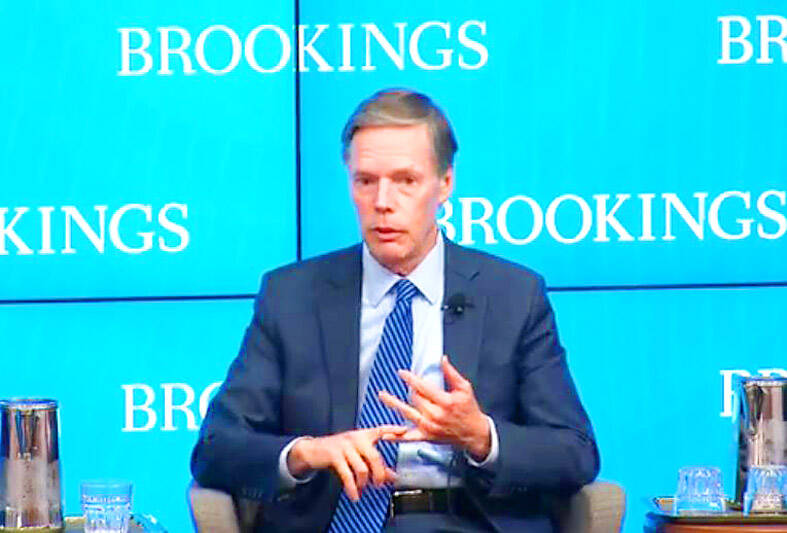The US on Friday warned China not to interfere in Taiwan’s upcoming presidential and legislative elections, urging “responsible behavior on all sides.”
The lead-up to the Jan. 13 poll is being closely watched — including by policymakers in Beijing and Washington — as it could determine the future of Taiwan’s relations with an increasingly bellicose China.
“Our strong expectation and hope is that those elections be free of intimidation, or coercion, or interference from all sides,” US Ambassador to China Nicholas Burns said at the Brookings Institution, a Washington-based think tank.

Photo: Screengrab from the Brookings Institution’s YouTube channel
“The United States is not involved and will not be involved in these elections,” Burns said.
More broadly, Burns said that “China wishes to become the strongest power in the Indo-Pacific” region, referring, for example, to its recent activities in the South China Sea.
The US and China are “in a competitive relationship” when it comes to their militaries and economies, he said.
However, Burns also addressed the economic giants’ ability to agree, particularly in the wake of a meeting last month between US President Joe Biden and Chinese President Xi Jinping (習近平).
The leaders agreed to restore military-to-military communications and tackle the fentanyl trade, a drug that causes tens of thousands of US overdose deaths each year.
The countries need to work together on issues such as climate change, narcotics, global health and food security, Burns said.
“No person in their right mind should want this relationship to end up in conflict or in war,” he said. “So we’re going to develop a relationship where we can compete, but, as the president [Biden] says, to compete responsibly, drive down the probability of a conflict and bring our people together in a balanced relationship is one way to do that.”
Burns called for enhancing people-to-people relations between the countries, adding that there were “15,000 American students six or seven years ago in China. Last year, we were down to 350.”
Before the COVID-19 pandemic, there were 354 direct flights per week between the two countries, compared with only 70 at present.
Additional reporting by AP

INVESTIGATION: The case is the latest instance of a DPP figure being implicated in an espionage network accused of allegedly leaking information to Chinese intelligence Democratic Progressive Party (DPP) member Ho Jen-chieh (何仁傑) was detained and held incommunicado yesterday on suspicion of spying for China during his tenure as assistant to then-minister of foreign affairs Joseph Wu (吳釗燮). The Taipei District Prosecutors’ Office said Ho was implicated during its investigation into alleged spying activities by former Presidential Office consultant Wu Shang-yu (吳尚雨). Prosecutors said there is reason to believe Ho breached the National Security Act (國家安全法) by leaking classified Ministry of Foreign Affairs information to Chinese intelligence. Following interrogation, prosecutors petitioned the Taipei District Court to detain Ho, citing concerns over potential collusion or tampering of evidence. The

NEGOTIATIONS: Taiwan has good relations with Washington and the outlook for the negotiations looks promising, Minister of Economic Affairs J.W. Kuo said Taiwan’s GDP growth this year is expected to decrease by 0.43 to 1.61 percentage points due to the effects of US tariffs, National Development Council (NDC) Minister Paul Liu (劉鏡清) said at a meeting of the legislature’s Economics Committee in Taipei yesterday, citing a preliminary estimate by a private research institution. Taiwan’s economy would be significantly affected by the 32 percent “reciprocal” tariffs slapped by the US, which took effect yesterday, Liu said, adding that GDP growth could fall below 3 percent and potentially even dip below 2 percent to 1.53 percent this year. The council has commissioned another institution

NEGOTIATIONS: The US response to the countermeasures and plans Taiwan presented has been positive, including boosting procurement and investment, the president said Taiwan is included in the first group for trade negotiations with the US, President William Lai (賴清德) said yesterday, as he seeks to shield Taiwanese exporters from a 32 percent tariff. In Washington, US Trade Representative Jamieson Greer said in an interview on Fox News on Thursday that he would speak to his Taiwanese and Israeli counterparts yesterday about tariffs after holding a long discussion with the Vietnamese earlier. US President Donald Trump on Wednesday postponed punishing levies on multiple trade partners, including Taiwan, for three months after trillions of US dollars were wiped off global markets. He has maintained a 10 percent

TRADE: The premier pledged safeguards on ‘Made in Taiwan’ labeling, anti-dumping measures and stricter export controls to strengthen its position in trade talks Products labeled “made in Taiwan” must be genuinely made in Taiwan, Premier Cho Jung-tai (卓榮泰) said yesterday, vowing to enforce strict safeguards against “origin laundering” and initiate anti-dumping investigations to prevent China dumping its products in Taiwan. Cho made the remarks in a discussion session with representatives from industries in Kaohsiung. In response to the US government’s recent announcement of “reciprocal” tariffs on its trading partners, President William Lai (賴清德) and Cho last week began a series of consultations with industry leaders nationwide to gather feedback and address concerns. Taiwanese and US officials held a videoconference on Friday evening to discuss the